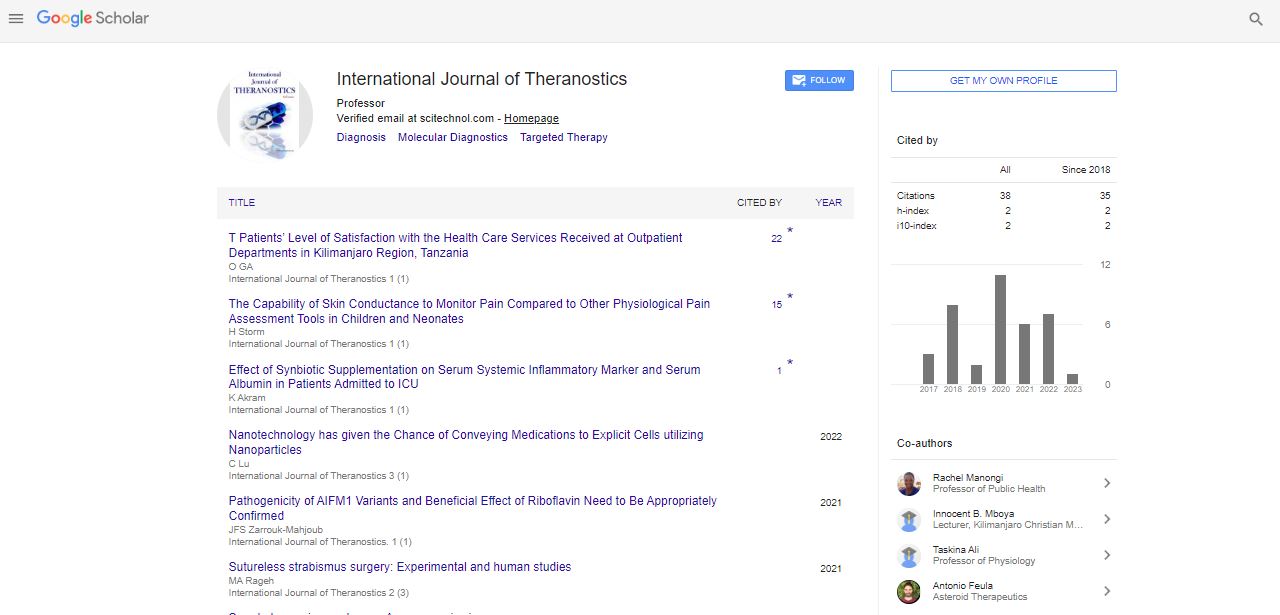Opinion Article, Int J Theranostic Vol: 12 Issue: 2
Molecular Diagnostics: Revolutionizing Disease Detection and Personalized Medicine
Batzu Grothe*
1Institute of Nanotheranostics, Swiss Federal Institute of Technology Zurich (ETH Zurich), Zurich, Switzerland
*Corresponding Author: Batzu Grothe,
Institute of Nanotheranostics, Swiss
Federal Institute of Technology Zurich (ETH Zurich), Zurich, Switzerland
E-mail: Grothezu666@hotmail.com
Received date: 29 May, 2023, Manuscript No. IJT-23-106946;
Editor assigned date: 31 May, 2023, PreQC No. IJT-23-106946 (PQ);
Reviewed date: 14 June, 2023, QCNo IJT-23-106946;
Revised date: 21 June, 2023, Manuscript No. IJT-23-106946 (R);
Published date: 30 June, 2023, DOI: 10.4172/IJT.1000128
Citation: Grothe B (2023) Molecular Diagnostics: Revolutionizing Disease Detection and Personalized Medicine. Int J Theranostic 12:2.
Description
Molecular diagnostics has emerged as a transformative field in medicine, harnessing the power of molecular and genetic analysis to detect diseases with unparalleled precision. This study provides a comprehensive review of molecular diagnostics, exploring its principles, techniques, applications, and impact on personalized medicine. It delves into the advantages and challenges of molecular diagnostics and discusses its potential to revolutionize disease detection and patient care.
Molecular diagnostics represents a paradigm shift in medical diagnostics, offering unparalleled sensitivity and specificity. This section introduces the concept of molecular diagnostics, emphasizing its potential to revolutionize disease detection and management.
Principles of molecular diagnostics
Nucleic acid amplification techniques: PCR (Polymerase Chain Reaction) and its variations, such as RT-PCR and qPCR, are powerful tools for amplifying specific nucleic acid sequences, enabling the detection of minute quantities of target DNA or RNA.
Nucleic acid hybridization: Hybridization techniques, like DNA microarrays and in situ hybridization, aid in the detection of specific nucleic acid sequences and gene expression patterns.
Next-Generation Sequencing (NGS): NGS technologies have revolutionized molecular diagnostics, enabling high-throughput sequencing of DNA and RNA, which is vital for detecting mutations, gene fusions, and genetic variations.
Applications of molecular diagnostics
Infectious diseases: Molecular diagnostics has significantly improved the detection of infectious agents, including viruses, bacteria, and parasites. Rapid and accurate identification allows for targeted treatment and infection control measures.
Cancer diagnostics: Molecular diagnostics plays a pivotal role in cancer diagnosis and prognosis. Detection of specific genetic alterations helps in personalized treatment selection and monitoring treatment response.
Genetic disorders: Early detection of genetic mutations and variations enables timely intervention and genetic counseling for patients and their families.
Pharmacogenomics: Pharmacogenomic testing helps optimize drug therapies by predicting an individual's response to medications, minimizing adverse effects, and improving treatment outcomes.
Impact on personalized medicine
Patient stratification: Molecular diagnostics enables the stratification of patients based on their genetic profile, helping to identify subgroups that may respond differently to specific treatments.
Targeted therapies: Personalized treatment strategies, driven by molecular diagnostic insights, lead to more effective and targeted therapies, minimizing unnecessary treatments and associated side effects.
Monitoring disease progression and response: Regular monitoring of molecular biomarkers aids in tracking disease progression and assessing treatment efficacy, allowing for timely adjustments in the treatment plan.
Advantages and challenges of molecular diagnostics
Advantages:
• Enhanced sensitivity and specificity over conventional diagnostic methods.
• Potential for early disease detection and intervention.
Support for precision medicine and personalized treatment approaches.
Challenges:
• Standardization and quality control to ensure reliable results.
• Cost considerations and accessibility in resource-limited settings.
• Ethical and privacy concerns related to genetic information.
Future Perspectives and Innovations
Liquid biopsies: Advancements in liquid biopsy techniques hold hope for non-invasive disease monitoring and early detection of cancer and other conditions.
Artificial Intelligence (AI) and machine learning: Integration of AI and machine learning algorithms can improve the accuracy and speed of molecular diagnostic analysis, leading to more efficient and precise diagnoses.
Point-of-care molecular diagnostics
Developing point-of-care molecular diagnostic devices will extend the benefits of molecular diagnostics to remote or resourceconstrained regions.
Conclusion
Molecular diagnostics has emerged as a powerful tool in modern medicine, offering unparalleled sensitivity and specificity in disease detection and personalized treatment. The continued advancements in technology and research will further enhance the impact of molecular diagnostics on patient care, ultimately leading to improved health outcomes and a more personalized approach to medicine.
 Spanish
Spanish  Chinese
Chinese  Russian
Russian  German
German  French
French  Japanese
Japanese  Portuguese
Portuguese  Hindi
Hindi 